9-8-2023 (BANGKOK)Thai shippers are urging the swift formation of a new government to allocate funds and take action to revitalize the country’s sluggish export sector, which has been facing challenges for several months.
Chaichan Chareonsuk, Chairman of the Thai National Shippers’ Council (TNSC), highlighted the risk factors that continue to impede export growth. These include geopolitical conflicts that impact global economic fluctuations and the slow economic expansion of Thailand’s key trading partners such as the United States, Europe, and China.
Chareonsuk also identified high global interest rates as a hindrance to financial liquidity. Additionally, rising production costs, including those for electricity and raw materials, are affecting Thailand’s price competitiveness.
Furthermore, changing weather patterns have led to reduced water levels in dams and reservoirs, which are adversely affecting agricultural production in the latter half of the year.
Chareonsuk emphasized the importance of government action in driving export activities in the second half of the year. He called for the continuation of free trade agreement negotiations and the exploration of new trade markets to bolster the economy.
To mitigate the impact of increasing production costs, both the public and private sectors need to expedite their management strategies. This includes addressing challenges related to electricity, labor, and interest rates. These efforts will have implications for trade negotiations with crucial competitors. Additionally, there is a need to accelerate investment to enhance production processes and adapt to new trade measures.
Chareonsuk emphasized that financial liquidity should be enhanced for businesses within supply chains, particularly small and medium-sized enterprises. He also stressed the importance of developing the skills and competencies of the workforce to meet market demand. Exploring new forms of international transport to reduce costs and improving efficiency in logistics are also crucial for enhancing trade competitiveness.
The private sector should embrace digital technology to improve production processes and delivery, Chareonsuk added.
According to the latest data from the Thai Ministry of Commerce, the value of exports declined for the ninth consecutive month in June. Exports fell by 6.4% to $24.8 billion, while imports decreased by 10.3% to $24.7 billion, resulting in a trade surplus of $57.7 million.
Exports of agricultural and agro-industrial products contracted by 8.6% year-on-year in June, amounting to $4.53 billion. Meanwhile, industrial product exports dropped by 4.6% to $19.3 billion.
For the first half of 2023, exports decreased by 5.4% to $141 billion, and imports declined by 3.5% to $147 billion, resulting in a trade deficit of $6.3 billion.
The TNSC estimates that exports for the full year will range from a 0.5% decline to 1% growth.




